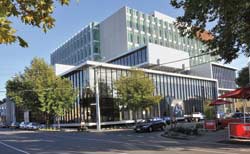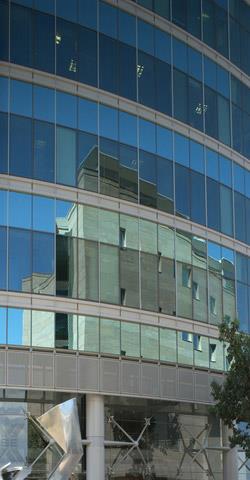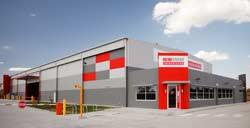Investec Australia Property Fund (IAPF) listed on the Johannesburg Stock Exchange (JSE) Main Board on 24 October with an initial portfolio valued at AUD130 million.

Sam Leon (non-executive director of Investec Australia Property Fund) and Graeme Katz (chief executive officer of Investec Australia Property Fund) carrying the kudu horn on listing at the Johannesburg Stock Exchange in Sandton, Johannesburg.
The portfolio consists of six high quality industrial assets and two A grade office buildings in Melbourne, Canberra, Brisbane and Adelaide and these properties are occupied by quality tenants thus underpinning known rental income.
Its strategy is to grow and diversify its asset base with further investments offering attractive income and capital growth profiles which will also spread investment risk
Investors buying this stock can expect sustainable growth in income and capital appreciation across a diversified portfolio.
Managed by an experienced team of entrepreneurial property specialists on the ground in Australia who have an established track record of managing third party property funds, this will ensure maintenance of a strong corporate governance framework to ensure the interests of investors are protected.
IAPF was established in 2012 and registered as a managed investment scheme in Australia on 6 February 2013.
It is an Australian Real Estate Investment Trust (REIT) which allows for the tax efficient flow-through of net rental income to unit holders and is currently a 100 percent wholly-owned subsidiary of Investec Bank (Australia) Limited.

One of two A grade office buildings with a total GLA of 11 917 square metres is 97.6 percent let.
The listing on the JSE will be primary and the fund is pursuing a secondary listing on the Bermuda Stock Exchange.
Speaking to Property24.com, Graeme Katz, IAPF chief executive officer, says the fund offers local investors a diverse investment in global markets, exposure to distributions in hard currency and benefit from long-term depreciation of the Rand through the ZAR-based units on the JSE.
On funding, Katz says they were able to raise enough capital ahead of the listing and the fund upon listing had not incurred any debt.
IAPF will benefit from four banks going forward when needing funds with the cost of debt at 5 percent while yields are expected to be close to 9 percent.
In the next nine months, he says they expect to spend AUD80 million on investments to grow the fund.
The core portfolio with a total GLA of 50 681 square metres is 99.4 percent let and mostly to high quality Australian Stock Exchange listed companies and large corporates on long leases with an expiry profile having no significant renewals for approximately six years.
“This solid property platform, combined with the Fund having no gearing at the outset gives us head room and the springboard to aggressively seek investment opportunities while always remaining faithful to our core focus to underlying property fundamentals,” says Katz.

As the world’s 19th largest exchange according to the World Federation of Exchanges, of which the JSE is a member, the exchange is recognised for its world-class regulation, sophistication, access to deep pools of capital and high participation of foreign investors, notes Fourie.
Sam Leon, IAPF non-executive director says investor interest which resulted in a significant over subscription is testament to the relative value and unique offering for the South African investor to gain direct exposure to Australian real estate as well as spread currency risk.
Leon says now that they have a blank cheque, they will start acquiring quality assets to grow pointing out that the property fundamentals are good.
The board of directors include Katz (Australian) Leon (South African), Richard Longes (Australian) chair of independent non-executive director and member of audit and risk committee, David Gonski (Australian) independent non-executive director, Sam Hackner (South African) non-executive director, Sally Herman (Australian) independent non-executive director and chair of audit and risk committee and Michael Crawford (South African) independent non-executive director and member of audit and risk committee.
SA listed property sector and the JSE
Asked why they chose to list at the JSE, Katz says the opportunity was right to list, low rates and seeing the gap in the market as pension funds and other investors have renewed appetite in the sector.
He says the fund will continue to acquire quality assets in office, retail and industrial property.
On the Australian listed property market, he says the market has settled down after too much debt gearing noting a couple of new listings as well.
Katz also points out that the macroeconomic fundamentals are supportive of a robust property sector as interest rates and inflation are expected to remain low.
Furthermore, the sector appears to be relatively attractively priced compared to South Africa and the persistent spread of listed property sector yields to bond yields indicate potential for capital uplift.
In SA listed property performance, the current historic rolled yield of the listed property is 6.78 percent and the sector is reportedly showing improvement following recent bond-driven share price volatility on the JSE.
According to Leila Fourie, director for post trade services at the JSE, IAPF is the 47th property fund to list on the JSE real estate sector where the average market is R6.85 billion.
“This is a sector that has seen much growth in the past seven years, growing from a market cap of R97.18 billion in 2006 to R365 billion as of 24 October,” she says.

48 Hawkins Crescent is an industrial property with a total GLA of 2 045 square metres and is currently fully let.
She notes that in the year to date, three companies including GoGlobal Properties (Altx), Tower Property Fund (Main Board) and Attacq Limited (Main Board) listed in this sector.
Fourie says while the majority of companies still choose to list on their domestic stock exchanges, the globalisation of capital has broadened the listing options around the world.
Listing standards, fees, regulatory environment, quality of institutional investors and participation of foreign investors are just a few factors that companies consider when selecting a listing destination.
“With such strong competition for quality companies, it is incredibly gratifying when a company decides to list on the JSE,” she says.
As the world’s 19th largest exchange according to the World Federation of Exchanges, of which the JSE is a member, the exchange is recognised for its world-class regulation, sophistication, access to deep pools of capital and high participation of foreign investors, notes Fourie.
Furthermore, she explains that in 2012, 45 percent of the JSE’s data was sold outside of South Africa, indicating international demand for South African equities and trust in the JSE.
This level of trust in the JSE is also recognised by the World Economic Forum (WEF) which ranks South Africa first for regulation for the fourth consecutive year – a ranking that naturally makes us proud, says Fourie.
“We are confident that IAPF has selected the right avenue for raising capital.”
According to the WEF, South Africa is ranked second in terms of raising finance through the local equity market.
She adds that from their levels of liquidity and degree of foreign participation – this year foreigners are net buyers of R27.02 billion worth of South African equities, a clear indication that South Africa offers deep pools of capital. – Denise Mhlanga









